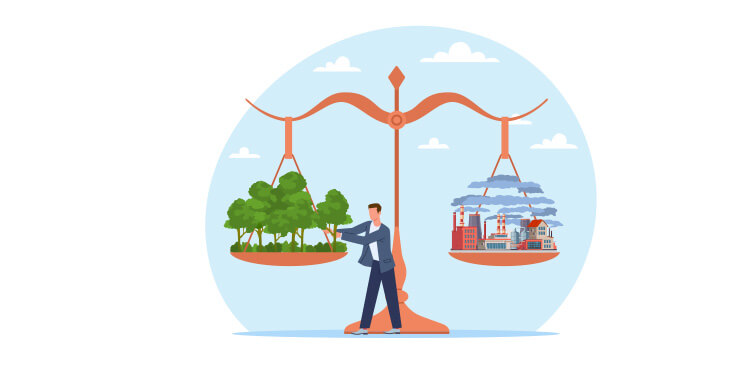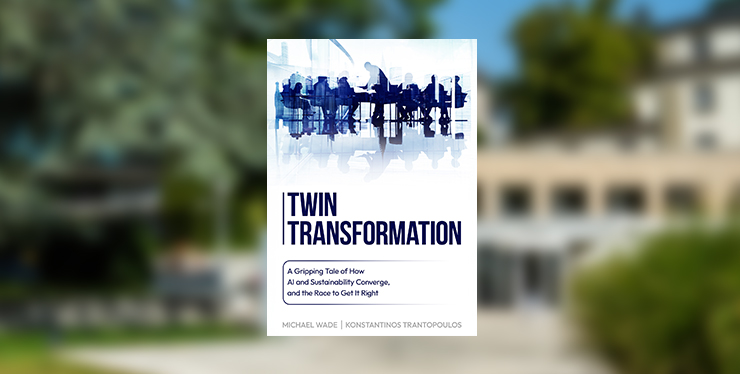
Sustainability is actually good news
Perhaps the biggest challenge for the 21st century is how to build a sustainable society. Overcoming this challenge means letting go of the rather negative vision of sustainability that concentrates mainly on what has gone wrong with our economic development model. Instead, we need to adopt a new mindset highlighting all the options and possibilities that a systemic approach to sustainability offers us. This new mindset is based on three main principles: 1) the wider use of objective scientific knowledge by both policy makers and resource users; 2) a new definition of value creation that focuses on shared value and shared responsibility; and 3) the promotion of sustainable innovation.
Take the issue of time horizons in the food sector. The increasing demand for marine resources has resulted in overfishing, which in turn has prompted us to focus on policing our oceans. However, institutions that want to successfully continue their fishing activities over the long term should focus their attention on maximizing the ecological capacity of our marine ecosystems and other life supporting systems to accommodate our demands.
The tuna industry, world trade in which is worth more than US$5 billion a year, provides a good example of this challenge. Tuna species are a significant source of food in many countries, but most tuna stocks are now considered to be fully- or overexploited. The roots of this problem include short-term attitudes as expressed in the high level of illegal, unreported and unregulated fishing; a limited understanding of the private sector’s role regarding value creation; and lack of imagination.
What is missing in the fishing industry, and in many others, is a fresh mindset and systemic approach based on the three principles mentioned above.
Scientific knowledge use
We now have enough scientific knowledge about how to successfully manage tuna stocks and set annual quotas that allow marine ecosystems to operate in balance. Using scientific information will allow us to continue consuming marine resources in the long term without jeopardizing our natural capital. Today we understand much better how marine ecosystems operate and can accurately measure the reproductive cycle of most species. Thus, our emphasis should not be limited to policing our waters but should include promoting initiatives to use this knowledge.
The Large Marine Ecosystem Network provides a good example of this shift in emphasis. It is dedicated to engaging an emerging sustainability-science community in building and maintaining a global network of policymakers and scientists who are committed to moving ecosystem-based management and coastal and marine spatial planning from paper to practice. This initiative and related activities are designed to create a forum for sharing information (e.g., data, lessons learned and best management practices) among a growing network of regional ocean partnership programs and sustainability-science researchers and practitioners.
Value creation: Shared value and responsibility
Many managers today see their main duties as creating economic value for shareholders and optimizing short-term financial performance even if this means the depletion of key natural resources vital to their businesses, their suppliers, and the communities in which they operate. A new approach has been suggested by Michael Porter—the principle of shared value—which involves creating economic value in a way that also creates value for society by addressing its needs and challenges.
However, to achieve shared value we also need shared responsibility. This requires consumers, non-governmental organizations and citizens to express their sustainability preferences with their behavior, and for voters to support public representatives whose agendas focus on the possibilities of sustainability.
Nestlé, for example, has adopted shared value as the backbone of its business strategy. The company is working with local farmers to promote water conservation and organic agriculture in order to reduce the environmental footprint and maximize the sustainable use of water and land ecosystems. At the same time, Nestlé is committed to reducing the amount of fat in its food products to address the obesity challenge and transform itself from a food-oriented to a nutrition-oriented company.
In general, companies moving toward sustainability have proceeded in a step approach – firstly by complying with environmental laws and regulations and then by building the business case for sustainability. Here companies take “eco-efficiency” measures to reduce resource inputs, materials and energy and establish systems that recapture the waste they generate and convert it into economic assets.
Sustainable innovation
The third step involves creativity and innovation, which lead to transformation. Herman Miller, an American furniture company, is one example of a firm that took earlier steps towards sustainability and is currently preparing for the transformational leap.
The company improved its eco-efficiency by cutting its overall waste from 41 million pounds in 1993 to 3.2 million pounds in 2008; its target is to produce 0 pounds by 2020. Having taken this step, Herman Miller began looking toward a full reformulation of its design processes. The company’s Design for the Environment (DfE) team collaborated with the eponymous McDonough Braungart Design Chemistry Company, founded by the authors of the seminal Cradle-to-Cradle: Remaking the Way We Make Things, to design a new chair. In addition to ergonomics and performance, the team worked with suppliers to apply standards in three main areas: chemical composition of inputs, disassembly and recyclability. Launched in 2003, the result was the “Mirra” chair, which is manufactured using wind and captured landfill off-gassing, uses 33% recyclable materials, and is up to 96% recyclable at the end of use.
To succeed in the new sustainability paradigm, businesses leaders will need to take a systemic approach and look more at options and possibilities. Their frameworks will not be narrow and merely self-interested, but comprehensive and inclusive. Their methods will not be simply incremental but will include far-reaching disruptive action. Their business goals will not be shareholder value alone, but corporate value creation that benefits society. They will achieve these goals by establishing relationships and working both with suppliers and with a wide range of stakeholders from public, civil society and consumer organizations. They will embrace sustainability as “good news” and not as a burden.
Francisco Szekely is the Sandoz Family Foundation Professor of Leadership and Sustainability and Director of the Global Center for Sustainability Leadership (CSL) at IMD. He directed the One Planet Leader (OPL) program, which helped companies integrate sustainability across their business in order to drive value creation and benefit the planet.
Heidi Strebel is a Research Associate for IMD’s Global Center for Sustainability Leadership.
Research Information & Knowledge Hub for additional information on IMD publications
The B case outlines how, by early 2025, Isabella Phoenix's initial vision for HP's Amplify Impact sustainability program had grown into a global initiative involving 4,800 partners in 48 countries. The program surpassed its goals, enrolling 59 of ...
The A case in this two-part series outlines the challenges Isabella Phoenix faced in designing a global sustainability program for HP's vast network of channel partners in just 12 weeks with only one team member and limited resources. The initiati...
In today’s boardrooms, two themes dominate: rapid technological advancement and the growing urgency of environmental accountability. But a new source of competitive advantage is emerging, not from A.I. or sustainability alone, but from the deliber...

In President Trump’s second term, a variety of executive actions have reversed social progress. Withdrawing from the Paris Climate Agreement presents a significant challenge to bending the global emissions curve since it is one of the world’s larg...
in I by IMD
Research Information & Knowledge Hub for additional information on IMD publications
Research Information & Knowledge Hub for additional information on IMD publications
Case reference: IMD-2681 ©2025
Research Information & Knowledge Hub for additional information on IMD publications
in I by IMD
Research Information & Knowledge Hub for additional information on IMD publications
Research Information & Knowledge Hub for additional information on IMD publications
in I by IMD
Research Information & Knowledge Hub for additional information on IMD publications
in I by IMD
Research Information & Knowledge Hub for additional information on IMD publications
Research Information & Knowledge Hub for additional information on IMD publications
Research Information & Knowledge Hub for additional information on IMD publications
in Stanford Social Innovation Review Online 2 June 2025
Research Information & Knowledge Hub for additional information on IMD publications







